

10 Ways to Help Your Child Succeed in Elementary School (for Parents) - Nemours KidsHealth. Support from parents is key to helping kids do well academically.
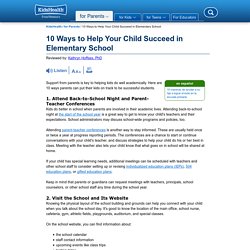
Here are 10 ways parents can put their kids on track to be successful students. 1. Attend Back-to-School Night and Parent-Teacher Conferences Kids do better in school when parents are involved in their academic lives. Attending back-to-school night at the start of the school year is a great way to get to know your child's teachers and their expectations. Attending parent-teacher conferences is another way to stay informed. If your child has special learning needs, additional meetings can be scheduled with teachers and other school staff to consider setting up or revising individualized education plans (IEPs), 504 education plans, or gifted education plans. Keep in mind that parents or guardians can request meetings with teachers, principals, school counselors, or other school staff any time during the school year. 2.
On the school website, you can find information about: 3. 4. 5. Homework soccer put clothes away 6. 7. Parental Involvement in Education - Research on Parental Involvement, Effects on Parental Involvement, Obstacles to Parental Involvement, Controversies, Current Issues - StateUniversity.com. Although widespread support for parental involvement is reflected in current educational policies and practices, what this means is not always clear.
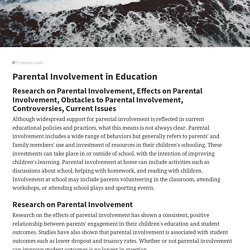
Parental involvement includes a wide range of behaviors but generally refers to parents' and family members' use and investment of resources in their children's schooling. These investments can take place in or outside of school, with the intention of improving children's learning. Parental involvement at home can include activities such as discussions about school, helping with homework, and reading with children. Involvement at school may include parents volunteering in the classroom, attending workshops, or attending school plays and sporting events. Effect of Parental Involvement on Children’s Academic Achievement in Chile.
Introduction On an international scale, parental involvement in school has long been heralded as an important and positive variable on children’s academic and socioemotional development.
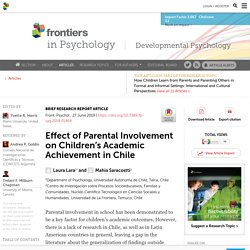
From an ecological framework, reciprocal positive interactions between these two key socializing spheres – families and schools – contribute positively to a child’s socioemotional and cognitive development (Bronfenbrenner, 1987). Empirical findings have demonstrated a positive association between parental involvement in education and academic achievement (Pérez Sánchez et al., 2013; Tárraga et al., 2017), improving children’s self-esteem and their academic performance (Garbacz et al., 2017) as well as school retention and attendance (Ross, 2016). Family involvement has also been found to be associated with positive school attachment on the part of children (Alcalay et al., 2005) as well as positive school climates (Cowan et al., 2012).
Correlation Between Parent Involvement And Student Success. Report - The Positive Relationship Between Family Involvement and Student Success. In the 2002 research review A New Wave of Evidence: The Impact of School, Family, and Community Connections on Student Achievement, Anne T.
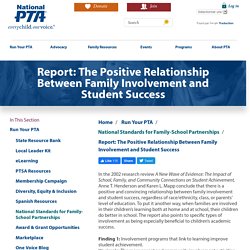
Henderson and Karen L. Mapp conclude that there is a positive and convincing relationship between family involvement and student success, regardless of race/ethnicity, class, or parents’ level of education. To put it another way, when families are involved in their children’s learning both at home and at school, their children do better in school. The report also points to specific types of involvement as being especially beneficial to children’s academic success. Finding 1: Involvement programs that link to learning improve student achievement. Family nights on math or literacy. Finding 2: Speaking up for children protects and promotes their success. Families should Become knowledgeable about the operations of schools and the laws that govern those operations. What Research Says About Parent Involvement. Many research studies support what teachers instinctively know: Students do better academically and socially when schools build positive relationships with their families.
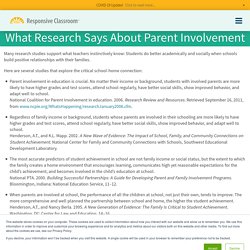
Here are several studies that explore the critical school-home connection: Parent involvement in education is crucial. No matter their income or background, students with involved parents are more likely to have higher grades and test scores, attend school regularly, have better social skills, show improved behavior, and adapt well to school. National Coalition for Parent Involvement in education. 2006.
Research Review and Resources. How Parent Involvement Leads to Student Success. Education How Parent Involvement Leads to Student Success November 1, 2018 Subscribe Share on facebook Share on twitter Share on pinterest What’s the most accurate predictor of academic achievement?
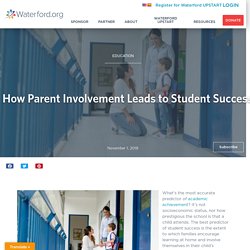
When parents are engaged in their children’s school lives, students have the home support and knowledge they need to not only finish their assignments, but also develop a lifelong love of learning. Teachers who focus on parent engagement often see a profound change in their classrooms. Encouraging parent engagement is more than common courtesy. What is Parent Engagement? According to experts, the definition of parent engagement is parents and teachers sharing a responsibility to help their children learn and meet educational goals. Parent engagement in schools is different from parent involvement, though both are useful.